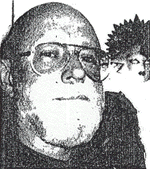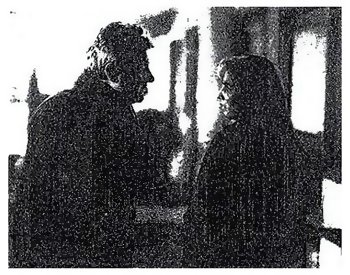Channel 7 has high hopes for its new police drama 'Blue Heelers'. Jim Schembri does not share its optimism. He confronted the show's writer and co-creator Tony Morphett with his reservations.
IF THERE are any surprises in Blue Heelers they are nowhere to be seen in its premiere two hours. It's A Country Practice meets Cop Shop as the characters in the rural community of Mount Thomas do little more than go through the motions expected of formula TV fodder.
The co-creator of the show, Tony Morphett, is one of Australia's leading TV writers, with credits that include such classics as Certain Women and several memorable mini-series such as The Shiralee, Tracks of Glory and The Dirtwater Dynasty.
In his cramped, central Sydney apartment surrounded by skulls and tribal trinkets and weird-looking works of art made by his daughter, he hunches his tall frame over the coffee table and fields some frank comments and questions about Blue Heelers.
Just what we need; another cop show.
Well, if you think about the history of episodic television, and you took out the cop shows, the medical shows and the legal shows, I'm not quite sure what you'd have left except for the real Jurassic cowboy shows.
I suppose the reason for this is it's the kind of area where stories walk in the door. That is, if you have a doctor's surgery a story will walk in the door every 20 minutes. If you have a hospital casualty ward, same deal. Police station, same deal.
Is it a case of cops being an eternally interesting subject or simply an eternally convenient subject?
Apparently they're an eternally interesting subject. If you think about crime fiction, which began probably with (Edgar Allan) Poe's Murders in the Rue Morgue (1841, the first detective story) and then through Conan Doyle (creator of Sherlock Holmes), all of his contemporaries and Agatha Christie, apparently it is an eternally interesting subject.
I mean, there am I, writing on a cop show, and every Friday night I'm watching Wexford. So what can I say?! (laughs).
'Blue Heelers' is also yet another show set in the country.
This was part of its evolution. Hal McElroy (co-creator) got Michael Winter, an ex-copper, in to provide some research for a cop show that was going to be set in the city. I wasn't involved in that, but in the process Michael started yarning in meetings, telling stories about when he was a cop in a country town in NSW.
Hal got interested and told Michael to put down 10 pages of what it was like being a young city cop transferred to the country. Then Hal threw those pages at me and Blue Heelers evolved out of that.
Australians have a kind of nostalgia for the bush. We were all born in the city, but we all feel that we've got one foot in the country, however false that impression is, and shows set in the country have succeeded. I mean A Country Practice did 10 years.
But it simply looks like you've gene-spliced two very successful TV format ideas — the cop show and the country soap. Why not keep 'A Country Practice' and just throw in a few extra cops?
I can't speak for Channel 7. As I say, the evolution of it was 10 pages of research that came from Michael Winter, which happened almost by accident when they were trying to develop another show. So it wasn't a cynical plot, it was a meeting of ideas.

Tony Morphett: "You write for the network, but you're also writing it for the audience."
You can understand the cynicism in the viewer...
Absolutely, except that having said that, there is a taste for country drama in Australia, there is a taste for cop drama. It hasn't been done since Matlock. Why not go for it?
The last local cop show on Seven was 'Skirts', not a resounding success. Bad omen?
I don't think so. The genre is so strong that I wouldn't take one failure as being a bad omen. Timing is everything. I thought Skirts was a very interesting show, maybe before its time. It had very good casting, and I'm sorry it didn't take off. But I'm not looking back over my shoulder thinking "are we doing the wrong thing by going for a show which is fresh, has a terrific cast, which is set in beautiful locations and has interesting stories?"
At the end of the day all you can do is try and make good product. Whether the audience will watch it is very much a matter of timing and chemistry between the characters.
The first episode of 'Blue Heelers', which you wrote, seems like a clumsy exercise in attention getting. Certainly, serial television has to follow a formula but in this first episode we've got:
- A dog shot dead by the 30-minute mark.
- An attempted suicide by 40 minutes.
- And a finale involving an old guy hugging a puppy in a pub.
It's a very busy hour. What were you writing this with? A sledgehammer?
It was clearly a very busy day in Mount Thomas! (laughs) That pilot went through five, seven drafts and with a pilot what you're trying to do, of course, is demonstrate several things. One is to establish characters and one is to develop the range of stories that you might be looking at, from high drama through to soft funny.
And the pilot, of course, is also trying to ride two horses. That is, you write it for the network, but you're also writing it for the audience. The network is probably interested in "do the characters have legs?" and "are we going to run out of stories in the first 13 hours?"
So the pilot changed and changed and changed. There was a whole different B story (i.e. sub-plot) at one stage, which was even more of a sledgehammer story. I'm sorry to have disappointed you by not putting that in. It was about a guy who dies on the road through steroid abuse.
So I can't argue with your criticisms. I agree with them.
Something that appears a misjudgment in the first episode is the young female police officer, Maggie Doyle (Lisa McCune), shooting a dog and then getting shot at by the owner on her very first day. It seems a pretty extreme scenario for her first day on the job.
Part of the modus operandi of the pilot, I suppose, was to meet Mt Thomas and the other police through the eyes of the young woman police officer. Maggie Doyle arrives in town and suddenly the ceiling falls in. She gets into her bedroom, gets to sleep and a local girl is raped after a football club party.
This is even before she starts her first shift!
We wanted to drop her in the deep end. And you can argue about this, but I think drama ought to be dramatic. I don't think either truth or drama would have been served by making Maggie's first day in Mt Thomas real dull.
The whole incident with the dog sounds like a wonderful action sequence, but you don't see in onscreen, it is just talked about afterwards. Was that because of budget restrictions?
No, it was me and the rest of the team. We didn't want to portray the shooting of a dog at 7.30 at night.
Why not?
I won't go into animal films because the animal always gets killed. I just won't go to them. I guess Bambi turned me off in a big way as a kid and I don't like animal films for this reason. I can go to Arnold Schwarzenegger and the Lethal Weapon and see people blown away.
The second episode (written by Peter Kinloch) involves a financier who comes to repossess a harvester. He protests to the cops at one stage that he is being stereotyped by the locals as the big standover man in a suit from the big smoke. Yet despite this, he goes on the fulfil the cliched bad-guy role.
I suppose that scene was where he did have his point of view stated. Nobody loves the repo man, but in fact the repo man does have a point of view.
But that line of dialogue suggests that a stereotype will be challenged when, in fact, it is serviced.
I thought that the repo man (pause) was somewhat softened in the casting because there was something about the guy playing the repo man that said he's more than a thug. No, I wasn't involved heavily in the script. I don't really don't want to go into another writer's script too much.
But the criticism that it is a cliche seems to be a glaring problem with that second episode.
It worked for me. I have to say that the episode worked for me.
It is obvious from the second episode that you are addressing problems and issues in rural Australia. But in all the shows set in the country there's barely a semi-regular black character among them. Why aren't there any black characters in this show?
It's a very good question. It's a situation which has been discussed in-house and I would certainly hope that there will be black characters in the show. I played around early on with a black policeman in the town, and that got lost in the shuffle. But I would certainly hope that there will be Kooris in Mt Thomas. It's a very fair question and needs addressing.
![]() Blue Heelers premieres on Channel 7 on Tuesday at 7.30pm.
Blue Heelers premieres on Channel 7 on Tuesday at 7.30pm.

